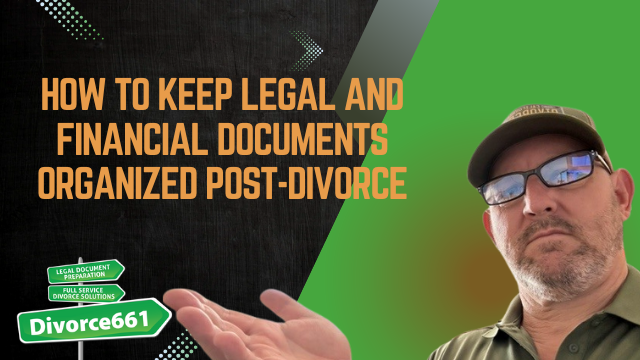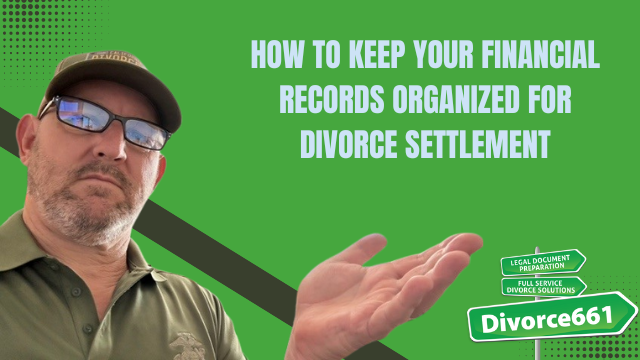How to Keep Legal and Financial Documents Organized Post-Divorce
Hi, I’m Tim Blankenship with Divorce661. I created a short video to walk you through one simple truth: staying organized is one of the best ways to protect yourself and stay in control of your finances after your divorce. Below I’ll lay out a practical, step-by-step approach for gathering, storing, and maintaining the legal and financial documents you’ll need going forward.
Why staying organized matters
Finalizing your divorce doesn’t mean the paperwork is finished. You’ll need documents for taxes, refinancing, travel with your children, insurance, and — sometimes — to modify your orders. Poor document management can cost you time, money, and a lot of stress. I once worked with a client who needed to refinance her mortgage two years after divorce but couldn’t locate her signed judgment or QDRO; it delayed the process by weeks.
“Staying organized is one of the best ways to protect yourself and stay in control of your finances moving forward.”
What documents to gather first
Start by collecting every final, signed court document. Keep both physical and digital copies.
- Divorce judgment (signed and entered by the court)
- Settlement agreement or Marital Settlement Agreement
- Support orders (child support, spousal support)
- Parenting plan and custody orders
- Qualified Domestic Relations Order (QDRO) for retirement accounts
- Any other related court filings, stipulations, or notices
Organize your financial records
Next, compile financial documents tied to the division of assets and ongoing obligations.
- Bank statements (checking, savings, joint accounts)
- Retirement account statements and QDRO paperwork
- Investment account records
- Property deeds and mortgage paperwork
- Vehicle titles and loan documents
- Insurance policies (health, life, auto, homeowners)
- Documentation related to support payments (bank transfers, cancelled checks, receipts)
- Tax returns (at least the years surrounding the divorce)
How to set up a reliable filing system
Choose a system you’ll actually use: physical, digital, or both. The key elements are consistency, labeling, and backups.
Physical filing
- Use a locked file cabinet or a fireproof safe.
- Create clearly labeled folders by category (Legal, Financial, Support, Insurance) and by year.
- Keep originals of court documents and deeds in a secure place; copies can go in your everyday file.
Digital filing
- Scan all documents into high-quality PDF files. Name files consistently, e.g., “2019_Divorce_Judgment.pdf” or “2023_QDRO_CompanyName.pdf.”
- Use cloud storage with encryption (Google Drive, Dropbox, OneDrive, or a dedicated encrypted vault).
- Keep at least one local backup (encrypted external hard drive) in addition to cloud storage.
- Consider using password managers or securely storing passwords for accounts tied to your documents.
Documenting support payments and communications
If you pay or receive spousal or child support, keep a detailed record of every transaction and related communication. This includes:
- Bank or transfer confirmations (dates, amounts, reference numbers)
- Cancelled checks or screenshots of electronic payments
- Email threads and text messages about payments or schedule changes
- A simple spreadsheet or ledger that logs each payment by date and method
These records are critical if there is ever a dispute, if you need to modify an order, or for lender verification during refinancing.
Practical tips and naming conventions
- Label folders and files by year and document type (e.g., “2024_Taxes.pdf,” “2019_Divorce_Judgment.pdf”).
- Keep an index or master list of what’s in your post-divorce binder or digital folder.
- When possible, keep originals (signed judgments, deeds, titles) in a fireproof safe or bank safety deposit box.
- Set a calendar reminder to review and purge (securely shred) old, unnecessary documents annually, while keeping important records indefinitely.
What to do if you can’t find a document
If a key document is missing — like a signed judgment or a QDRO — don’t panic. Here’s what we recommend:
- Contact your attorney or the court clerk to request certified copies of court documents.
- Contact the retirement plan administrator for QDRO status and replacement copies.
- Rebuild your file by scanning anyone you can find and requesting official replacements as needed.
How Divorce661 helps
At Divorce661 we don’t stop once the papers are filed. We help clients set up post-divorce file systems, scan and store documents, and teach practical record-keeping habits so you can avoid unnecessary delays and stress in the future. Our flat-fee, remote services across California include guidance on what to keep, how to store it, and how to make your records easily accessible when you need them.
Next steps — a simple checklist
- Gather and photocopy all final court documents (judgment, settlement, QDRO).
- Scan and name files consistently; store in at least two secure locations (cloud + local backup).
- Create labeled folders for financial accounts, property, insurance, and support records.
- Log every support payment and keep communications organized.
- Schedule an annual review of your post-divorce files.
Final thoughts and how to get help
Organizing your legal and financial documents after divorce isn’t glamorous, but it’s one of the smartest investments you can make in your future peace of mind. If you’ve recently finalized your divorce and want help setting up a post-divorce file system, visit Divorce661.com and schedule a free consultation. We’ll help you stay organized, stay protected, and move forward with confidence.
— Tim Blankenship, Divorce661




